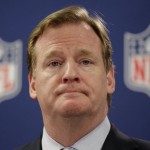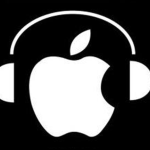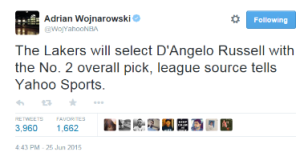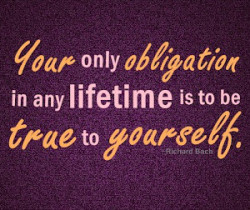I was reading Richard Deitsch’s column on Sports Illustrated when I stumbled onto something that got my juices flowing. It was a response from Yahoo Sports’ Adrian Wojnarowski as told to Jason Smith on Fox Sports Radio about his approach on why he puts out information on draft night before the actual announcements are made on television.
 Wojnarowski said “Nobody allows me to do it, I’m going to do it. No one is going to tell me what to do. I’m not going to ever work at a place where I could be told [otherwise]. Listen, this is what it is. When I have news, I’m going to report it. I don’t care about ESPN’s television show, I could care less about it. The draft is a ceremony; the decision to draft a player has already been made. Should I sit around a wait for teams to send out press releases when they’ve traded for a player or signed a free agent? I’d be out of work. So I just look at the draft as an extension of free agency or the trade deadline. When I have the information and it’s accurate, that’s when I’m going to report it, whether or not they’ve had their ceremony where they announce it. I can’t even imagine not reporting news when you have it or being told by somebody. I don’t know how they do in the NFL, but come on, if you have news, you report it.”
Wojnarowski said “Nobody allows me to do it, I’m going to do it. No one is going to tell me what to do. I’m not going to ever work at a place where I could be told [otherwise]. Listen, this is what it is. When I have news, I’m going to report it. I don’t care about ESPN’s television show, I could care less about it. The draft is a ceremony; the decision to draft a player has already been made. Should I sit around a wait for teams to send out press releases when they’ve traded for a player or signed a free agent? I’d be out of work. So I just look at the draft as an extension of free agency or the trade deadline. When I have the information and it’s accurate, that’s when I’m going to report it, whether or not they’ve had their ceremony where they announce it. I can’t even imagine not reporting news when you have it or being told by somebody. I don’t know how they do in the NFL, but come on, if you have news, you report it.”
Anyone who follows Wojnarowski on Twitter knows that he is hands down one of the best reporters in the sports business and his information on the NBA dwarfs his competitors. He clearly works hard to develop relationships and trust and gather information inside NBA circles that is accurate, and he’s built up a connection with his followers where they trust him.
From where I sit, I respect his view and approach and I think we need more of it in today’s media world. What Adrian is saying and doing is right, and as a consumer of content, fans appreciate this and want more of it which is why he has over one million followers despite not having the promotional power of the ESPN machine. Adrian’s main objective is to inform his audience and because he makes serving them his number one priority, they reward him by reading, posting, commenting and promoting his work. That’s the ultimate relationship between a content generator and a consumer of content.
 The reason his words stand out to me are because I’ve watched our industry make a number of giant mistakes in dealing with professional sports franchises, leagues and athletes. For example, when multiple media outlets surrendered power to the NFL on draft night to not release draft information on Twitter, that was wrong. Not only did they cut their own reporters legs out from under them, but more importantly they failed to superserve their fans. If someone doesn’t want to know what’s happening, they’ll simply not follow along on Twitter and stick to watching the television show. But if they’re on Twitter during the NFL Draft, they’re there because they want to learn more information about what’s happening.
The reason his words stand out to me are because I’ve watched our industry make a number of giant mistakes in dealing with professional sports franchises, leagues and athletes. For example, when multiple media outlets surrendered power to the NFL on draft night to not release draft information on Twitter, that was wrong. Not only did they cut their own reporters legs out from under them, but more importantly they failed to superserve their fans. If someone doesn’t want to know what’s happening, they’ll simply not follow along on Twitter and stick to watching the television show. But if they’re on Twitter during the NFL Draft, they’re there because they want to learn more information about what’s happening.
If a television network or radio company is going to partner with a team or league to air games on its channel, one of the first things that should be understood is that the media company can not and will not compromise its integrity to break news and deliver accurate information. Issuing policies to deny reporters the ability to do their jobs or sending down mandates to prevent personalities from talking candidly about their feelings on specific subjects that might not be comfortable, only creates a bigger divide and strains the relationship. We are in the business of entertaining and informing and nothing should compromise our ability to do that.
 Secondly, if a media outlet is going to pay large sums of money to carry these games and give up massive amounts of inventory, shouldn’t they have the right and the ability to decide what they do inside the remainder of their own programming? When did the league or team become the program director of the rest of the media company’s programming? They didn’t but because our business is reliant on delivering ad dollars and making budgets each month, those who are battling to keep our companies profitable on the business end, often don’t want to take on the challenge of dealing with a frustrated franchise owner and risk the possibility of losing a team’s rights or bruising the relationship. While I understand the trepidation, there are sometimes where you’ve got to defend the lifeblood of your company’s existence.
Secondly, if a media outlet is going to pay large sums of money to carry these games and give up massive amounts of inventory, shouldn’t they have the right and the ability to decide what they do inside the remainder of their own programming? When did the league or team become the program director of the rest of the media company’s programming? They didn’t but because our business is reliant on delivering ad dollars and making budgets each month, those who are battling to keep our companies profitable on the business end, often don’t want to take on the challenge of dealing with a frustrated franchise owner and risk the possibility of losing a team’s rights or bruising the relationship. While I understand the trepidation, there are sometimes where you’ve got to defend the lifeblood of your company’s existence.
Somewhere along the way, media groups began giving back too much power to those who they are supposed to be business partners with and if it doesn’t change down the road, quality talent will be lost and audiences will eventually go elsewhere where the content isn’t compromised. Think that’s rubbish? ESPN has the most powerful sports platforms on the planet yet when it comes to the NBA they get beaten by TNT on the television side and by Adrian Wojnarowski on the news breaking side. You can have the platform but if the content isn’t as strong, audiences will go elsewhere to find it.
 Take for example what Apple is about to do to the music industry. It’s exciting, refreshing and based on the company’s track record, likely to be a smashing success. On Monday the company announced they wouldn’t accept traditional advertising and instead would focus on weaving sponsors in through the use of spoken word sponsorships. Think that might be keeping a few CEO’s up late tonight?
Take for example what Apple is about to do to the music industry. It’s exciting, refreshing and based on the company’s track record, likely to be a smashing success. On Monday the company announced they wouldn’t accept traditional advertising and instead would focus on weaving sponsors in through the use of spoken word sponsorships. Think that might be keeping a few CEO’s up late tonight?
What a novel concept – hire great talent, deliver high quality programming, limit the amount of interruptions, connect the sponsors in ways that make them sound part of the brand through the use of DJ endorsements and created content, and keep the focus on serving the listener. By standing up to the advertising community and setting a tone for what will and won’t be permitted, Apple has placed a huge focus on the audience and I’m willing to bet that they’ll be rewarded for that approach in very large numbers.
Currently, Spotify has seventy five million people using their service, Pandora has eighty five million and YouTube has over one billion. Why are people flocking to these services? Because they’re content rich and focused on serving the user. They’re not forcing fifteen to twenty minutes of spots per hour on listeners and they’re putting the advertising in places where it sounds natural and does minimal damage. They’re also not letting others dictate their content offerings or company’s policies. Coincidentally they continue to grow their audiences.
 This is no different than why sports fans who love the NBA rely on Adrian Wojnarowski. They enjoy reading his columns because they’re packed with information and insight and they read, favorite and retweet his tweets because they get fast accurate information about their favorite players and teams and in turn that leads them to seek out more of it. They also know that they can get this quality content without it being compromised with ads or forced agendas from outside forces.
This is no different than why sports fans who love the NBA rely on Adrian Wojnarowski. They enjoy reading his columns because they’re packed with information and insight and they read, favorite and retweet his tweets because they get fast accurate information about their favorite players and teams and in turn that leads them to seek out more of it. They also know that they can get this quality content without it being compromised with ads or forced agendas from outside forces.
As the media world turns over the next few years it’s going to be interesting to see how media outlets respond to these increasing pressures from teams, organizations and advertisers while the audience grows even more interested in digital, mobile and social programming. A brand is only as strong as the talent it employs and the content it delivers, and fans today want exceptional content from dynamic personalities and they expect it in rapid fashion. If you’re not clicking on all cylinders consistently, then be prepared to watch your fan base decrease in the weeks, months and years ahead.
If you saw the movie “The Social Network” you may remember the scene where Mark Zuckerberg and Eduardo Saverin meet with Sean Parker to discuss the future of Facebook. In the scene, Saverin talks about Facebook’s early growth and how he wants to explore taking advertising while Zuckerberg is against it. They ask Parker’s opinion of who’s right and he tells them that ads aren’t cool and based on where they are as a company, it would be a bad move. In the future when they’ve built a great product that people love and support then you can explore that option but concentrate first on the product.
Now ask yourself this, does your operation approach things this way? I’ve been in four different buildings over the past nine years and while some definitely put a stronger focus on content and appeasing the audience than others, most are focused first and foremost on advertising dollars and minimizing expenses. That’s just the way the business operates.
 While those problems are worrisome, there are some ways to be ahead of the curve. The first step starts with doing a brand analysis and creating a gameplan to make sure you’re doing things to create strong engagement with your audience. By doing so you develop fans, and when you gain a strong level of loyalty from your listeners, they usually stick around for a long time. Long lasting connections between a brand and its audience is critical to having sustained success. If you don’t come out of your brand analysis with the understanding that the listener is your top priority, re-do the exercise. You will not be relevant, important and profitable for the long term without them.
While those problems are worrisome, there are some ways to be ahead of the curve. The first step starts with doing a brand analysis and creating a gameplan to make sure you’re doing things to create strong engagement with your audience. By doing so you develop fans, and when you gain a strong level of loyalty from your listeners, they usually stick around for a long time. Long lasting connections between a brand and its audience is critical to having sustained success. If you don’t come out of your brand analysis with the understanding that the listener is your top priority, re-do the exercise. You will not be relevant, important and profitable for the long term without them.
You can concentrate your efforts on satisfying advertisers and partnerships first and they’ll appreciate it but when audiences begin to flock to other outlets in the future, those good feelings will vanish because in the world of business, it’s about results, and advertisers want their messages heard in places where they can reach the largest amount of people for the best possible price. You can decrease rates, offer more spots, take them to games or jump through other hoops but if your audience isn’t strong and with you for the long haul, neither will be your clients or bottom line.
 The second part that we need to do a stronger job with, is standing up to those who we partner with. There’s power in the word “No” and sometimes you’ve got to use it. Broadcast companies are spending millions on signals, licenses, operating space, employee salaries, state of the art equipment and lord knows what else so the least we can do to justify their investment is stand up and support our talent and programming decisions even when it’s not comfortable. If you’re willing to give away content time on your platforms for things that don’t appeal to the audience, it will cost you. Content options are stronger than ever and people don’t want to their time listening to things that don’t serve their needs.
The second part that we need to do a stronger job with, is standing up to those who we partner with. There’s power in the word “No” and sometimes you’ve got to use it. Broadcast companies are spending millions on signals, licenses, operating space, employee salaries, state of the art equipment and lord knows what else so the least we can do to justify their investment is stand up and support our talent and programming decisions even when it’s not comfortable. If you’re willing to give away content time on your platforms for things that don’t appeal to the audience, it will cost you. Content options are stronger than ever and people don’t want to their time listening to things that don’t serve their needs.
I once heard Oakland Raiders play by play voice and 95.7 The Game host Greg Papa say something that really stuck with me. He said “At the end of the day, my boss isn’t Jason Barrett, our GM or even Entercom Communications – it’s the audience. If they don’t like what I’m doing it then it’s my job to change it. They’re the ones that matter“. That type of thinking is very true and vital to any organization’s success.
 Your local teams aren’t wrong in asking for you to give them more positive content or encouraging you to avoid talking about their competitors or criticizing them. It’s your job though to know when to say no and do what’s best for your station and most importantly, your audience. Adrian Wojnarowski has taken that approach in his career and judging by the results, it seems to be working pretty well. When you deliver high quality content and focus on serving your audience it’s impossible to lose! That’s not rocket science. It’s just good business!
Your local teams aren’t wrong in asking for you to give them more positive content or encouraging you to avoid talking about their competitors or criticizing them. It’s your job though to know when to say no and do what’s best for your station and most importantly, your audience. Adrian Wojnarowski has taken that approach in his career and judging by the results, it seems to be working pretty well. When you deliver high quality content and focus on serving your audience it’s impossible to lose! That’s not rocket science. It’s just good business!

Jason Barrett is the Founder and CEO of Barrett Media. The company launched in September 2015 and has provided consulting services to America’s top audio and video brands, while simultaneously covering the media industry at BarrettMedia.com, becoming a daily destination for media professionals. Prior to Barrett Media, Jason built and programmed 95.7 The Game in San Francisco, and 101 ESPN in St. Louis. He was also the first sports programmer for SportsTalk 950 in Philadelphia, which later became 97.5 The Fanatic. Barrett also led 590 The Fan KFNS in St. Louis, and ESPN 1340/1390 in Poughkeepsie, NY, and worked on-air and behind the scenes at 101.5 WPDH, WTBQ 1110AM, and WPYX 106.5. He also spent two years at ESPN Radio in Bristol, CT producing ‘The Dan Patrick Show’ and ‘GameNight’. JB can be reached on Twitter @SportsRadioPD or by email at Jason@BarrettMedia.com.




